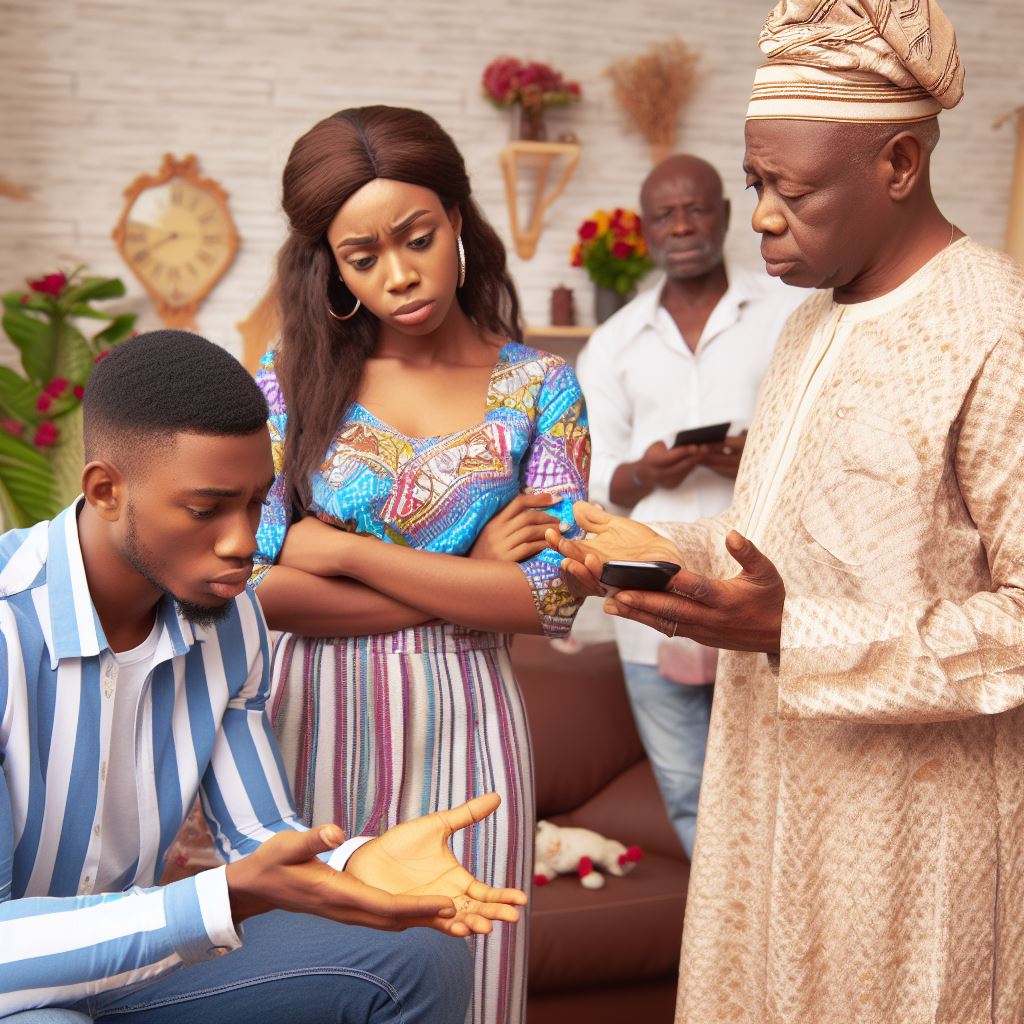The Role of In-laws: Stories from Newlyweds in Nigeria
Last Updated on January 28, 2024
Introduction
In Nigerian culture, in-laws play a significant role in marriages by providing support and guidance.
They are considered an integral part of the family unit and can greatly influence the dynamics of a married couple.
Discussing the role of in-laws is crucial to ensure a harmonious and understanding relationship.
Brief overview
This blog post aims to explore the significance of in-laws in Nigerian culture and emphasize the importance of discussing their role in marriages.
Readers can expect to gain insights into the traditions, expectations, and challenges that come with having in-laws.
The narratives of newlyweds will serve as examples to illustrate the diverse experiences and perspectives on this topic.
By sharing these stories, readers will be able to understand the complexities of navigating relationships with in-laws and find strategies to foster healthy and respectful dynamics.
Traditional Roles
In Nigerian marriages, in-laws play vital traditional roles, offering support, mediation, and cultural preservation.
These roles encompass:
- Support and Guidance: In-laws provide essential support, advice, and emotional guidance to newlyweds.
- Conflict Resolution: They mediate conflicts and help resolve issues between the couple, preventing escalation.
- Bride Price Tradition: Groom’s family pays bride price to symbolize commitment and seriousness.
- Introduction Ceremony: They organize and partake in the “Igba Nkwu,” introducing the bride to the extended family and community.
- Cultural Preservation: In-laws ensure cultural practices, ceremonies, and values are upheld and passed down.
- Educational Role: They teach the couple about cultural traditions, customs, and important ceremonies.
- Continuous Support: Some in-laws may reside with the newlyweds, offering ongoing guidance and wisdom.
- Mediation in Conflicts: In-laws prevent disputes from damaging the marriage by using their experience.
- Strengthening Family Bonds: Their involvement enhances the connection between the couple and their families.
- Cultural Heritage: In-laws play a crucial role in preserving and passing down cultural heritage to the next generation.
While some of these roles may have evolved, their significance in Nigerian society remains prominent.
Read: Marriage Milestones: Custom Wishes for Each Year in Nigeria
Modern Perspectives
The role of in-laws in contemporary Nigerian society has transformed significantly due to globalization and urbanization.
Key points:
- Modern couples encounter distinct challenges in managing their relationships with in-laws.
- With global exposure, expectations for in-laws have evolved.
- Urbanization and migration to cities impact traditional values and in-law dynamics.
- Conflict may arise due to clashing expectations influenced by diverse media and cultural influences.
- Maintaining respect and harmony with in-laws is a priority for modern couples.
- Open communication, setting boundaries, and compromise help navigate relationships with in-laws.
- Couples vary in how they involve in-laws and make decisions, balancing tradition and autonomy.
- Financial considerations may affect in-law dynamics, with couples seeking autonomy while managing expectations.
- Perspectives differ based on culture, religion, and socioeconomic background.
- The evolving role of in-laws in Nigeria requires modern couples to blend traditional values with contemporary ideals, fostering mutual respect and communication.
Read: Unique Anniversary Wishes Inspired by Nigerian Folklore

In-law Stories
When it comes to the role of in-laws in Nigerian marriages, personal anecdotes and stories from newlyweds shed light on the diverse experiences and interactions they have with their extended families.
These stories give us a glimpse into the challenges and positives that come with navigating the dynamics of in-law relationships in modern Nigeria.
Positive In-law Experiences
- Adeola, a newlywed from Lagos, shares her heartwarming experience with her in-laws. From the moment she joined their family, her in-laws embraced her as their own child, showering her with love and support.
- Chibuzo’s in-laws in Enugu have played a crucial role in cementing his marriage. They provided a strong support system, guiding him and his spouse through the challenges of marriage with their wise counsel.
- In Kano, Ibrahim’s in-laws have been instrumental in fostering unity and understanding in his marriage. They regularly organize family gatherings and celebrations which have allowed him and his wife to bond with their extended family members.
- Ngozi, a newly married woman in Port Harcourt, credits her in-laws for teaching her valuable life skills. They have mentored her in household management and parenting, ensuring a smooth transition into married life.
- For Osas and Tunde, their in-laws from Edo have been a pillar of financial support. During difficult times, their extended family stepped in and offered assistance, proving that they are always there for them.
Challenging In-law Interactions
- Olamide’s experience with her in-laws in Ibadan has not been entirely smooth. She regularly faces criticism and judgment, feeling she can never fully live up to their expectations.
- Emeka’s in-laws in Aba frequently interfere in his and his wife’s decision-making process, causing strain and tensions in their marriage. It has taken them time to establish boundaries and assert their independence.
- For Fatima, her in-laws in Maiduguri have displayed favoritism towards their other children, often neglecting her needs and opinions. This has led to feelings of exclusion and isolation within her marital home.
- Chioma’s in-laws from Owerri have strict cultural expectations that she finds challenging to fulfill. Their traditional beliefs clash with her modern lifestyle, resulting in constant friction and disagreements.
Shaping the Understanding of In-law Roles in Nigeria
These personal stories serve as a reminder of the significance of in-laws in Nigerian marriages, both positive and negative.
They illustrate the importance of healthy boundaries, effective communication, and mutual respect within these relationships.
They also highlight how diverse experiences with in-laws can shape societal perceptions and expectations of these roles.
In some instances, in-laws serve as mentors, financial support, and a source of unity.
However, challenging interactions can lead to discord and hinder marital bliss.
By listening to these stories and acknowledging their impact, we can begin to understand and appreciate the multifaceted role that in-laws play in modern Nigerian marriages.
It encourages open dialogue and promotes the development of strategies to foster healthier and more supportive relationships with in-laws.
Ultimately, a balanced and respectful relationship with in-laws is vital for a successful and harmonious marriage in Nigeria.
Read: Step-by-Step: How to Properly Fill Out Nigeria’s Marriage Form
Tips for Building Positive Relationships
Practical advice for newlyweds on fostering healthy relationships with their in-laws
- Set boundaries early on to establish clear expectations and prevent misunderstandings.
- Take the time to get to know your in-laws on a personal level and show genuine interest in their lives.
- Be open-minded and willing to compromise to find common ground with your in-laws.
- Show appreciation and gratitude for the support and love your in-laws provide.
- Include your in-laws in important events and occasions to strengthen the bond between families.
Tips for effective communication and managing conflicts with in-laws
- Be a good listener and try to understand the perspective of your in-laws.
- Communicate openly and honestly, expressing your needs and concerns in a respectful manner.
- Avoid making assumptions and confront issues directly with your in-laws.
- Seek compromises and find solutions that benefit all parties involved.
- Consider seeking professional help, such as couples therapy, if conflicts persist.
The importance of mutual respect and understanding between all parties involved
For a harmonious relationship with your in-laws, mutual respect and understanding are crucial.
It is essential to:
- Recognize and appreciate cultural differences between your families, fostering tolerance and acceptance.
- Be patient and forgiving, understanding that relationships take time to develop and navigate.
- Acknowledge that different perspectives and opinions can coexist without causing conflict.
- Practice empathy and put yourself in your in-laws’ shoes to understand their feelings and motivations.
- Remember that building positive relationships requires effort from all parties involved.
Cultivating positive relationships with in-laws can greatly enhance the overall happiness and stability of a marriage.
By implementing practical tips, effectively communicating, and respecting one another, newlyweds can create a supportive and loving environment for themselves and their in-laws.
Read: The History of Marriage Documentation in Nigeria Explored
Discover More: Hausa Wedding Blessings: A Glimpse into Northern Nigeria
Conclusion
The role of in-laws in Nigerian marriages is of utmost significance.
In-laws have the ability to either strengthen or strain the relationship between newlyweds.
Through the stories shared in this blog post, we have seen how in-laws can provide support, guidance, and wisdom to newlyweds, but also how their actions can lead to conflict and stress.
It is important for couples to navigate this relationship with open communication, respect, and understanding.
By engaging in conversations about the role of in-laws in their own relationships, readers have the opportunity to gain insights, learn from others, and find solutions to potential challenges.
Open and respectful conversations are key to maintaining a healthy and balanced in-law relationship.


